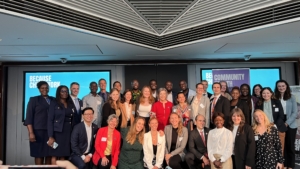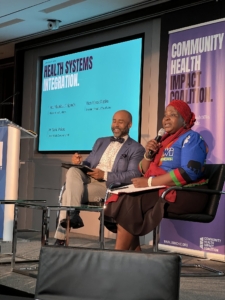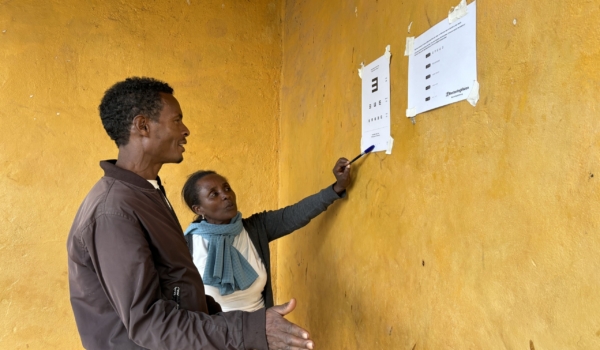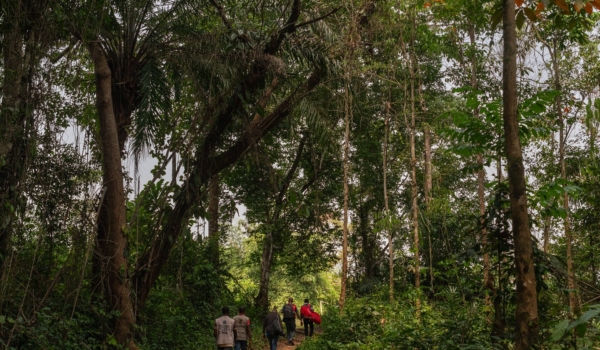Last Mile Health joined world leaders, policymakers, and peers at the 78th Session of the United Nations General Assembly in New York. Our goal: champion the essential contributions of professional community health workers toward universal health coverage and pandemic preparedness and response.
We attended more than 45 side events, hosted an event with our partner Jhpiego that connected health workers from across the Global South to health leaders gathered in New York City, and advocated at the U.N. high-level meetings on pandemic prevention, preparedness, and response and universal health coverage. Here are four themes that were at the forefront of UNGA 78.
1. We need to invest in professional community health workers and integrate them into health systems.
“Experience shows us that when we invest in CHWs, and when they are salaried, skilled, supervised and supplied, they can improve health outcomes with equity.” – James Nardella, Chief Program Officer, Last Mile Health.
At side events hosted by Community Health Impact Coalition and others, and in the halls of the United Nations, we heard a consistent message emphasized by community health workers, implementing organizations, government leaders, funders, and policy makers: the time is now to invest in paid community health workers and the systems that enable their success as professionals.
Minister Chiponda of Malawi emphasized the consequences of inaction, when she reminded us that, “If you think prevention is expensive, try getting sick.”
2. The health workforce crisis is also a gender crisis.
“Create policies that abolish the pay gap for women on the frontlines of health care, that abolish the notion that there can be free work, especially on the backs of people in these communities that are keeping their own people safe and keeping the rest of us safe.” – Dr. Raj Panjabi, Last Mile Health co-founder.
At this year’s Clinton Global Initiative, Chelsea Clinton announced our new commitment to action with Integrate Health to advance gender equity in the community health workforce. The commitment details our plans to increase our gender mainstreaming efforts in Liberia and Ethiopia, and publish and amplify lessons learned globally to guide other countries. “Their programs to support and strengthen gender-responsive community healthcare will promote better health outcomes and reduce preventable deaths,” said Chelsea Clinton.
The New York Times published a powerful piece on the fight for fair pay for female community health workers, which cites Last Mile Health’s research with the Government of Liberia and Co-Impact to identify and overcome barriers to women becoming paid community health workers as part of the national program. Our co-founder Raj Panjabi echoed this call to action during a panel at the Clinton Global Initiative.
3. Health and climate are deeply intertwined.
“The climate crisis is killing us.” – Dr. Vanessa Kerry, CEO, SEED Global Health
Climate change is the greatest health threat we face. And it is already impacting morbidity and mortality in Africa and around the world. This connection was on the agenda throughout the week, at the Clinton Global Initiative, the Devex Summit, and more. It remains in focus as we look ahead toward COP 28 and the first-ever COP Health Day.
Community health workers are critical for responding to the health impacts of a changing climate. An investment in community health is an investment in climate response.
4. Health workers need a seat at the table in conversations about health policies.
“Now is the time to turn words into action.” – Ms. Bupe Sinkala, CHW Advocate and mentor mother, mothers2mothers
Exclusionary visa policies continue to prevent health workers from low- and middle-income countries from attending major global convenings about health. This includes the World Health Assembly and United Nations General Assembly, among other notable examples.
In response to the challenge, we co-hosted an event with Jhpiego titled “From Abuja & NYC: Health Workers at the Heart of Primary Healthcare and Pandemic Preparedness,” which was the only UNGA side event that happened simultaneously in New York City and on the African continent. The event brought the direct experiences of frontline health workers from India, Burkina Faso, and Nigeria into conversations in New York City. Though this is a small step, it’s an important one to ensure the health workers leading this work have a voice in the decisions impacting them.
Watch the full Jhpiego and Last Mile Health event recording here: https://www.youtube.com/watch?v=_aedfsGk2d0.
From “why” to “how”
Last Mile Health attended United Nations General Assembly 78 to raise the political will for professional community health workers. We were energized to see this political will for community health well-represented, by leaders like Dr. Atul Gawande, the Assistant Administrator for Global Health at USAID, and Dr Raji Tajudeen, Head of the Division of Public Health Institutes and Research at Africa CDC, and from funders like Johnson and Johnson and the Gates Foundation.
The question has shifted from why we should invest in community health workers to how to professionalize a community health workforce that is capable of bringing a health worker within reach of everyone, everywhere. Together, we must translate public commitments into tangible actions that benefit the lives of millions of people living in rural and remote communities.






